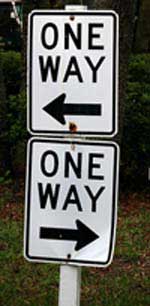This section is designed to give you some answers to the questions economics students frequently ask.

Pic by Lucias Clay on Flickr
1) How can I find advice on module options?
You will have a number of module options available at university and your first port of call would be to speak to lecturers, tutors and departments about which options are available. Most university departments will provide their own information packs on units, and so it is important to liaise with your department on this.
That being said, most economics degrees follow a common pattern. Each year students will be studying a number of compulsory and optional modules. The proportion of modules that you have to choose will typically increase as you progress through your undergraduate degree.
The precise content of each module will vary from university to university – but the things that you should consider when making your choice are the same.
Universities offer a wide range of modules presenting us with a difficult task. We have chosen 20 modules that we feel are representative of all Universities nation-wide. Names and content of modules will differ depending upon the institution. Not all institutions offer all 20 modules listed but many offer others that we haven’t covered. Choose individual modules from the list on the right, or go through all 20 starting with Agriculture.
2) How will my degree make me employable?
Why not take a look at our employability profile page? Here you will find information on the types of skills and abilities you will gain as an economics undergraduate, which make you very appealing to employers! Indeed, Andy Ross, the former deputy director of the UK Government Economic Service and deputy director at HM Treasury says that “Economics degrees provide powerful insights into a huge range of real-life issues while opening the door to a very wide range of career choices. It’s a fascinating subject and a life-long interest that will enhance both your understanding of the world and your career opportunities whether you become a professional economist or not”.
3) How does my degree relate to the real world?
We understand that you will learn a lot of theory as an economics student and you may find yourself asking how it applies to the real world. Blogs and news stories can help, if you think about which basic economic principles might be at work! Popular economics blogs include those by economists Paul Krugman, Roger Farmer, Diane Coyle and Tim Harford. You may also find it useful to look at our Student Essay Competition responses from 2010 which answered: How is your economics degree preparing you for life?
4) What else can I do with an economics degree, if I don’t become an economist?
Many things! Our careers cloud identifies a number of careers you can pursue with an economics degree, but the possibilities are endless! What is important is to see how all of the skills you learn as an economics graduate can be applied to numerous career paths. Employers in all industries are very keen to find individuals with the ability to analyse and interpret quantitative data and the ability to work effectively with others- just some of the skills you gain from studying economics.
5) Does extra reading really matter?
Yes! You can never do too much reading. In fact, to achieve the very top marks in exams, you need to refer to outside reading. For example, marking criteria specifically states that to achieve a 2:1 and above students must show, “Evidence of study, comprehension, and synthesis beyond the bounds of what has been explicitly taught.” Why not then subscribe to any of the following resources: The Economist, The Financial Times, The RES’ Economic Journal and/or The Quarterly Journal of Economics. All of these publications offer sound economic analysis on current goings on worldwide and you will often find that they draw upon certain economic models that feature in class. You can also read numerous blogs such as Rethinking Economics, Post-Crash Economics and Mainly Macro, just to name a few.
6) How can I develop my skills?
University offers the perfect environment to develop a number of skills. If you are looking at a career in journalism, for example, try to get involved with your university paper or student newspapers. A huge range of skills can be developed through involvement in societies and universities do not fall short of choice when it comes to joining these. From sports to charitable organisations to chocolate appreciation, there will be at least one that takes your fancy; if not, you can start your own. How entrepreneurial!
7) I want to build up a great CV at university- how do I go about doing so?
Similar to the question above, employers love to hear about how you have developed certain skills from your involvement in numerous things which you can add to your CV. One example which is always impressive is to have taken part in essay competitions, such as those run by the Royal Economic Society. You can also get involved in a huge range of societies to build up your leadership and teamwork skills which can also be done through volunteering. Employers like to hire people who can demonstrate motivation and hard work, even if they haven’t been getting paid for their efforts. University careers services can be helpful in finding volunteer roles and also tend to provide skills workshops whereby you can learn fresh skills or build upon ones you have already learnt.
